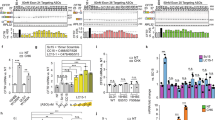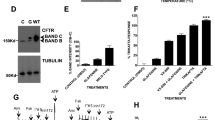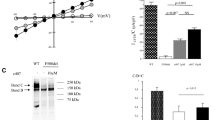Abstract
Cystic fibrosis (CF) is one of the most common genetic diseases in the Caucasian population and is characterized by chronic obstructive pulmonary disease, exocrine pancreatic insufficiency, and elevation of sodium and chloride concentrations in the sweat and infertility in men. The disease is caused by mutations in the CF transmembrane conductance regulator (CFTR) gene, which encodes a protein that functions as chloride channel at the apical membrane of different epithelia. Owing to the high genotypic and phenotypic disease heterogeneity, effects and consequences of the majority of the CFTR mutations have not yet been studied. Recently, the frameshift mutation 3905insT was identified as the second most frequent mutation in the Swiss population and found to be associated with a severe phenotype. The frameshift mutation produces a premature termination codon (PTC) in exon 20, and transcripts bearing this PTC are potential targets for degradation through nonsense-mediated mRNA decay (NMD) and/or for exon skipping through nonsense-associated alternative splicing (NAS). Using RT–PCR analysis in lymphocytes and different tissue types from patients carrying the mutation, we showed that the PTC introduced by the mutation does neither elicit a degradation of the mRNA through NMD nor an alternative splicing through NAS. Moreover, immunocytochemical analysis in nasal epithelial cells revealed a significantly reduced amount of CFTR at the apical membrane providing a possible molecular explanation for the more severe phenotype observed in F508del/3905insT compound heterozygotes compared with F508del homozygotes. However, further experiments are needed to elucidate the fate of the 3905insT CFTR in the cell after its biosynthesis.
Similar content being viewed by others
Log in or create a free account to read this content
Gain free access to this article, as well as selected content from this journal and more on nature.com
or
References
Rosenstein BJ, Cutting GR : The diagnosis of cystic fibrosis: a consensus statement. Cystic Fibrosis Foundation Consensus Panel. J Pediatr 1998; 132: 589–595.
Knowles MR, Durie PR : What is cystic fibrosis? N Engl J Med 2002; 347: 439–442.
Chillon M, Casals T, Mercier B et al: Mutations in the cystic fibrosis gene in patients with congenital absence of the vas deferens. N Engl J Med 1995; 332: 1475–1480.
Zielenski J, Patrizio P, Corey M et al: CFTR gene variant for patients with congenital absence of vas deferens. Am J Hum Genet 1995; 57: 958–960.
Riordan JR, Rommens JM, Kerem B et al: Identification of the cystic fibrosis gene: cloning and characterization of complementary DNA. Science 1989; 245: 1066–1073.
Kerem B, Rommens JM, Buchanan JA et al: Identification of the cystic fibrosis gene: genetic analysis. Science 1989; 245: 1073–1080.
Collins FS : Cystic fibrosis: molecular biology and therapeutic implications. Science 1992; 256: 774–779.
Hergersberg M, Balakrishnan J, Bettecken T et al: A new mutation, 3905insT, accounts for 4.8% of 1173 CF chromosomes in Switzerland and causes a severe phenotype. Hum Genet 1997; 100: 220–223.
Liechti-Gallati S, Bonsall I, Malik N et al: Genotype/phenotype association in cystic fibrosis: analyses of the delta F508, R553X, and 3905insT mutations. Pediatr Res 1992; 32: 175–178.
Kraemer R, Birrer P, Liechti-Gallati S : Genotype-phenotype association in infants with cystic fibrosis at the time of diagnosis. Pediatr Res 1998; 44: 920–926.
Schibler A, Bolt I, Gallati S, Schoni MH, Kraemer R : High morbidity and mortality in cystic fibrosis patients compound heterozygous for 3905insT and deltaF508. Eur Respir J 2001; 17: 1181–1186.
Kraemer R, Baldwin DN, Ammann RA, Frey U, Gallati S : Progression of pulmonary hyperinflation and trapped gas associated with genetic and environmental factors in children with cystic fibrosis. Respir Res 2006; 7: 138.
Frischmeyer PA, Dietz HC : Nonsense-mediated mRNA decay in health and disease. Hum Mol Genet 1999; 8: 1893–1900.
Hentze MW, Kulozik AE : A perfect message: RNA surveillance and nonsense-mediated decay. Cell 1999; 96: 307–310.
Nagy E, Maquat LE : A rule for termination-codon position within intron-containing genes: when nonsense affects RNA abundance. Trends Biochem Sci 1998; 23: 198–199.
Maquat LE : Nonsense-mediated mRNA decay: splicing, translation and mRNP dynamics. Nat Rev Mol Cell Biol 2004; 5: 89–99.
Eberle AB, Stalder L, Mathys H, Orozco RZ, Muhlemann O : Posttranscriptional gene regulation by spatial rearrangement of the 3′ untranslated region. PLoS Biol 2008; 6: e92.
Silva AL, Ribeiro P, Inacio A, Liebhaber SA, Romao L : Proximity of the poly(A)-binding protein to a premature termination codon inhibits mammalian nonsense-mediated mRNA decay. RNA 2008; 14: 563–576.
Maquat LE : NASty effects on fibrillin pre-mRNA splicing: another case of ESE does it, but proposals for translation-dependent splice site choice live on. Genes Dev 2002; 16: 1743–1753.
Liechti-Gallati S, Schneider V, Neeser D, Kraemer R : Two buffer PAGE system-based SSCP/HD analysis: a general protocol for rapid and sensitive mutation screening in cystic fibrosis and any other human genetic disease. Eur J Hum Genet 1999; 7: 590–598.
Carvalho-Oliveira I, Efthymiadou A, Malho R et al: CFTR localization in native airway cells and cell lines expressing wild-type or F508del-CFTR by a panel of different antibodies. J Histochem Cytochem 2004; 52: 193–203.
Wang J, Chang YF, Hamilton JI, Wilkinson MF : Nonsense-associated altered splicing: a frame-dependent response distinct from nonsense-mediated decay. Mol Cell 2002; 10: 951–957.
Linde L, Boelz S, Neu-Yilik G, Kulozik AE, Kerem B : The efficiency of nonsense-mediated mRNA decay is an inherent character and varies among different cells. Eur J Hum Genet 2007; 15: 1156–1162.
Romao L, Inacio A, Santos S et al: Nonsense mutations in the human beta-globin gene lead to unexpected levels of cytoplasmic mRNA accumulation. Blood 2000; 96: 2895–2901.
Asselta R, Duga S, Spena S et al: Congenital afibrinogenemia: mutations leading to premature termination codons in fibrinogen A alpha-chain gene are not associated with the decay of the mutant mRNAs. Blood 2001; 98: 3685–3692.
Perrin-Vidoz L, Sinilnikova OM, Stoppa-Lyonnet D, Lenoir GM, Mazoyer S : The nonsense-mediated mRNA decay pathway triggers degradation of most BRCA1 mRNAs bearing premature termination codons. Hum Mol Genet 2002; 11: 2805–2814.
Danckwardt S, Neu-Yilik G, Thermann R, Frede U, Hentze MW, Kulozik AE : Abnormally spliced beta-globin mRNAs: a single point mutation generates transcripts sensitive and insensitive to nonsense-mediated mRNA decay. Blood 2002; 99: 1811–1816.
Denecke J, Kranz C, Kemming D, Koch HG, Marquardt T : An activated 5′ cryptic splice site in the human ALG3 gene generates a premature termination codon insensitive to nonsense-mediated mRNA decay in a new case of congenital disorder of glycosylation type Id (CDG-Id). Hum Mutat 2004; 23: 477–486.
Neerman-Arbez M, Germanos-Haddad M, Tzanidakis K et al: Expression and analysis of a split premature termination codon in FGG responsible for congenital afibrinogenemia: escape from RNA surveillance mechanisms in transfected cells. Blood 2004; 104: 3618–3623.
Stalder L, Muhlemann O : The meaning of nonsense. Trends Cell Biol 2008; 18: 315–321.
Klausner RD, Sitia R : Protein degradation in the endoplasmic reticulum. Cell 1990; 62: 611–614.
Kopito RR : Biosynthesis and degradation of CFTR. Physiol Rev 1999; 79: S167–S173.
Sermet-Gaudelus I, Vallee B, Urbin I et al: Normal function of the cystic fibrosis conductance regulator protein can be associated with homozygous (Delta)F508 mutation. Pediatr Res 2002; 52: 628–635.
Bronsveld I, Mekus F, Bijman J et al: Chloride conductance and genetic background modulate the cystic fibrosis phenotype of Delta F508 homozygous twins and siblings. J Clin Invest 2001; 108: 1705–1715.
Thomas SR, Jaffe A, Geddes DM, Hodson ME, Alton EW : Pulmonary disease severity in men with deltaF508 cystic fibrosis and residual chloride secretion. Lancet 1999; 353: 984–985.
Penque D, Mendes F, Beck S et al: Cystic fibrosis F508del patients have apically localized CFTR in a reduced number of airway cells. Lab Invest 2000; 80: 857–868.
Dormer RL, McNeilly CM, Morris MR et al: Localisation of wild-type and DeltaF508-CFTR in nasal epithelial cells. Pflugers Arch 2001; 443 (Suppl 1): S117–S120.
Haardt M, Benharouga M, Lechardeur D, Kartner N, Lukacs GL : C-terminal truncations destabilize the cystic fibrosis transmembrane conductance regulator without impairing its biogenesis. A novel class of mutation. J Biol Chem 1999; 274: 21873–21877.
Benharouga M, Haardt M, Kartner N, Lukacs GL : COOH-terminal truncations promote proteasome-dependent degradation of mature cystic fibrosis transmembrane conductance regulator from post-Golgi compartments. J Cell Biol 2001; 153: 957–970.
Acknowledgements
We are indebted to the patients and clinicians involved for their cooperation and collaboration and thank André Eble for EBV transformation of the lymphocytes. This work was funded by grants from the Swiss National Foundation (3200-066767.01 to SG, 310000-112652 to SG).
Author information
Authors and Affiliations
Corresponding author
Rights and permissions
About this article
Cite this article
Sanz, J., von Känel, T., Schneider, M. et al. The CFTR frameshift mutation 3905insT and its effect at transcript and protein level. Eur J Hum Genet 18, 212–217 (2010). https://doi.org/10.1038/ejhg.2009.140
Received:
Revised:
Accepted:
Published:
Issue date:
DOI: https://doi.org/10.1038/ejhg.2009.140



